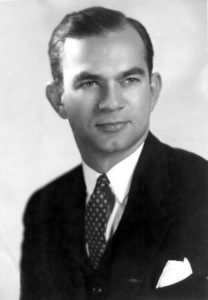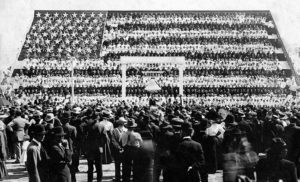calsfoundation@cals.org
Going Beyond the Individual with the CALS Encyclopedia of Arkansas
Self-perception is distorted when we treat such things—principally ourselves—as models for reality, making separability and independence, not reciprocity, our moral ideal. Weather is the better paradigm for inquiries regarding the categorical features of things, because weather is systemic. Every system evolving within the atmosphere has a merely temporary integrity, and a character determined as much by its conditions as by its internal states. Each thing is formed from others, and each one sustains itself by drawing substance and energy from them before it is dissolved and reincorporated, piecemeal, into its successors.
—David Weissman, A Social Ontology (2000)

The ongoing debate over maintaining or removing statues of such figures as Robert E. Lee or J. William Fulbright (a debate to which I’ve made my own modest contributions) has centered upon the reasons such people were initially honored, how we reevaluate the contents of our public square as our culture and our values continue to evolve, and the diverse perspectives that various groups of Americans possess about our shared past. However, one reality of public commemoration that we continue to avoid discussing is the ultimate fallacy of our collective focus upon individuals as individuals.
I recently came upon a four-year-old NPR story on William Weaver, one of fourteen Black students who integrated West High School of Knoxville, Tennessee, in 1964. His teachers were consistently flunking him, leading him to doubt his own academic capabilities, until one evening his former junior high school science teacher, Edward Hill, along with other teachers from Weaver’s former all-Black school, started tutoring him on the side, every day after classes ended at West High and on Saturday mornings.
And then one day, Weaver was astounded to receive a letter from Howard University offering him a scholarship. He had never even applied, but he ended up going to Howard and becoming a doctor, eventually rising to chief of surgery at the Fayetteville VA Medical Center in North Carolina. Upon a return trip home years later for his brother’s funeral, Weaver was talking to his old teacher and mentioned the surprise scholarship from Howard, only to learn that Hill had sent in the application on his behalf.
Weaver said: “So Mr. Hill stepped in and, I believe, saved my life,” though, at the time Weaver says he didn’t realize how much he was being helped. “And that’s the ignorance of youth and the wisdom of age when you look back on it you say, ‘How did I get here? How did I make it?’ Because people helped you, whether you knew it or not.”
The ruling ideas of “philosophical liberalism,” those perspectives advanced by the likes of John Stuart Mill and Jean-Jacques Rousseau, exhibit what can be called atomism, or the idea that humans exist as autonomous creatures whose decisions are representations of their own internal drives. It’s a view opposed by the modern philosopher David Weissman, who instead regards human beings as complex systems. Just as weather systems such as hurricanes are formed in just the right conditions and then draw strength, or are weakened, as those conditions evolve, so, too, do human beings come to life embedded within specific circumstances, and their temporary journey on this planet depends upon what conditions are provided them.
Generals do not ride to victory alone. Their success depends upon the political climate back home, the ability of a population to endure privations, the bravery of their soldiers, and the sensibility of their fellow generals. Likewise, as we saw above, the success of those students who were the first to desegregate schools depended significantly upon the existence of a broader community invested in their greatness. Because none of us can get through this life alone, no matter how grand or how humble our ultimate aims.
***

So when you next log on to the CALS Encyclopedia of Arkansas, I want you to try to think beyond the individual. Maybe you just came to the EOA for some facts about some artist or politician or writer, but take a moment to follow some of the hyperlinks we have within the body of these entries. Read about the towns where that person was born, the academies or universities where they were educated, the political parties or organizations of which they were members, and the other people whom they supported or opposed. Explore the broader conditions in which these people arose if you really want to understand them—and to continue to understand yourself and all the connections that make you what you are.
“Each thing is formed from others,” Weissman writes, “and each one sustains itself by drawing substance and energy from them before it is dissolved and reincorporated, piecemeal, into its successors.” The successful life, I am convinced, is not the life that is heralded for its individual worth but, rather, the life that, at its end, leaves behind substance and energy enough for those who come after, to take and do with what they want, what they need.
By Guy Lancaster, editor of the CALS Encyclopedia of Arkansas




